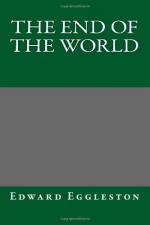“I know,” he whisperd.
“Know what?” asked Andrew, leaning down to catch his words.
“Julia.” And a single tear crept out from under the closed lid. The tender mother wiped it away.
After resting a moment, August looked up at Andrew’s face inquiringly.
“She is coming,” said the Philosopher.
August smiled very faintly, but Andrew was sure he smiled, and again leaned down his ear.
“She is here,” whispered August; “I heard Charon bark, and I—saw—your—face.”
Andrew now stepped to the closet-door and opened it, and Julia came out.
“Blamed ef he a’n’t a witch!” whispered Jonas. “Cunjures a angel out of his cupboard!”
Julia did not see anybody or anything but the white and wasted face upon the pillow. The eyes were now closed again, and she quickly crossed the floor, and—not without a faint maidenly blush—stooped and kissed the parched lips, from which the life seemed already to have fled.
And August with difficulty disengaged his wasted hand from the cover, and laid his nerveless fingers—alas! like a skeleton’s now—In the warm hand of Julia, and said—she leaned down to listen, an he whispered feebly through his dry lips out of a full heart—“Thank God!”
And the Philosopher, catching the words, said audibly, “Amen!”
And the mother only wept.
CHAPTER XXXV.
GETTING READY FOR THE END.
How Julia spent two hours of blessed sadness at the castle; how August slept peacefully for five minutes at a time with his hand in hers, and then awoke and looked at her, and then slumbered again; how she moistened his parched lips for him, and gave him wine; how at last she had to bid him a painful farewell; how the mother gave her a benediction in German and a kiss; how Wilhelmina clung to her with tears; how Jonas called her a turtle-dove angel; how Brother Hall, the preacher who had been sent for at the mother’s request, to converse with the dying man, spoke a few consoling words to her; how Gottlieb confided to Jonas his intention never to “sprach nodin ’pout Yangee kirls no more;” and how at last Uncle Andrew walked home with her, I have not time to tell. When the Philosopher bade her adieu, he called her names which she did not understand. But she turned back to him, and after a minute’s hesitation, spoke huskily. “Uncle Andrew if he—if he should get worse—I want—”
“I know, my daughter; you want him to die your husband?”
“Yes, if he wishes it. Send for me day or night, and I’ll come in spite of everybody.”
“God bless you, my daughter!” said Andrew. And he watched until she got safely into the house without discovery, and then he went back satisfied and proud.
Of course August died, and Julia devoted herself to philanthropic labors. It is the fashion now for novels to end thus sadly, and you would not have me be out of the fashion.




